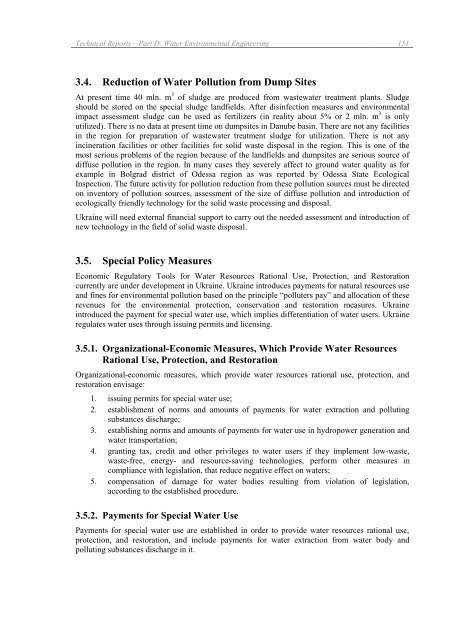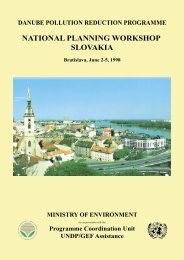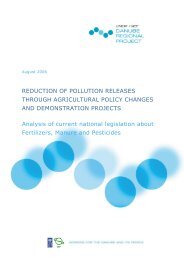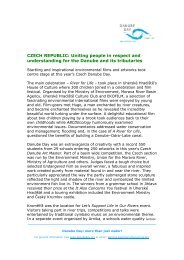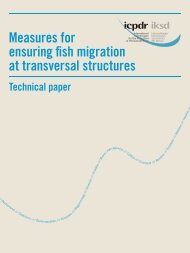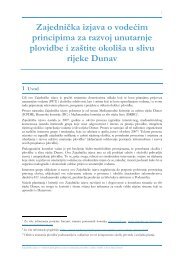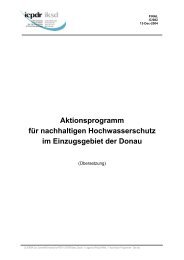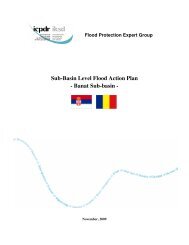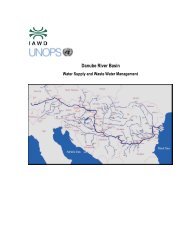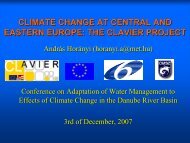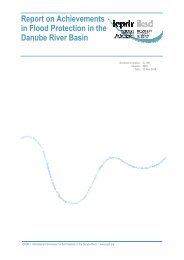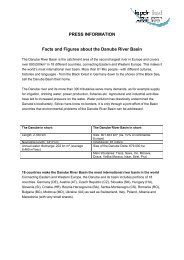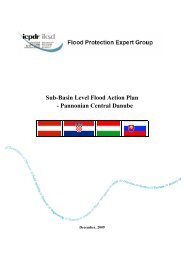Technical Reports Parts C,D - ICPDR
Technical Reports Parts C,D - ICPDR
Technical Reports Parts C,D - ICPDR
Create successful ePaper yourself
Turn your PDF publications into a flip-book with our unique Google optimized e-Paper software.
<strong>Technical</strong> <strong>Reports</strong> – Part D: Water Environmental Engineering 151<br />
3.4. Reduction of Water Pollution from Dump Sites<br />
At present time 40 mln. m 3 of sludge are produced from wastewater treatment plants. Sludge<br />
should be stored on the special sludge landfields. After disinfection measures and environmental<br />
impact assessment sludge can be used as fertilizers (in reality about 5% or 2 mln. m 3 is only<br />
utilized). There is no data at present time on dumpsites in Danube basin. There are not any facilities<br />
in the region for preparation of wastewater treatment sludge for utilization. There is not any<br />
incineration facilities or other facilities for solid waste disposal in the region. This is one of the<br />
most serious problems of the region because of the landfields and dumpsites are serious source of<br />
diffuse pollution in the region. In many cases they severely affect to ground water quality as for<br />
example in Bolgrad district of Odessa region as was reported by Odessa State Ecological<br />
Inspection. The future activity for pollution reduction from these pollution sources must be directed<br />
on inventory of pollution sources, assessment of the size of diffuse pollution and introduction of<br />
ecologically friendly technology for the solid waste processing and disposal.<br />
Ukraine will need external financial support to carry out the needed assessment and introduction of<br />
new technology in the field of solid waste disposal.<br />
3.5. Special Policy Measures<br />
Economic Regulatory Tools for Water Resources Rational Use, Protection, and Restoration<br />
currently are under development in Ukraine. Ukraine introduces payments for natural resources use<br />
and fines for environmental pollution based on the principle “polluters pay” and allocation of these<br />
revenues for the environmental protection, conservation and restoration measures. Ukraine<br />
introduced the payment for special water use, which implies differentiation of water users. Ukraine<br />
regulates water uses through issuing permits and licensing.<br />
3.5.1. Organizational-Economic Measures, Which Provide Water Resources<br />
Rational Use, Protection, and Restoration<br />
Organizational-economic measures, which provide water resources rational use, protection, and<br />
restoration envisage:<br />
1. issuing permits for special water use;<br />
2. establishment of norms and amounts of payments for water extraction and polluting<br />
substances discharge;<br />
3. establishing norms and amounts of payments for water use in hydropower generation and<br />
water transportation;<br />
4. granting tax, credit and other privileges to water users if they implement low-waste,<br />
waste-free, energy- and resource-saving technologies, perform other measures in<br />
compliance with legislation, that reduce negative effect on waters;<br />
5. compensation of damage for water bodies resulting from violation of legislation,<br />
according to the established procedure.<br />
3.5.2. Payments for Special Water Use<br />
Payments for special water use are established in order to provide water resources rational use,<br />
protection, and restoration, and include payments for water extraction from water body and<br />
polluting substances discharge in it.


